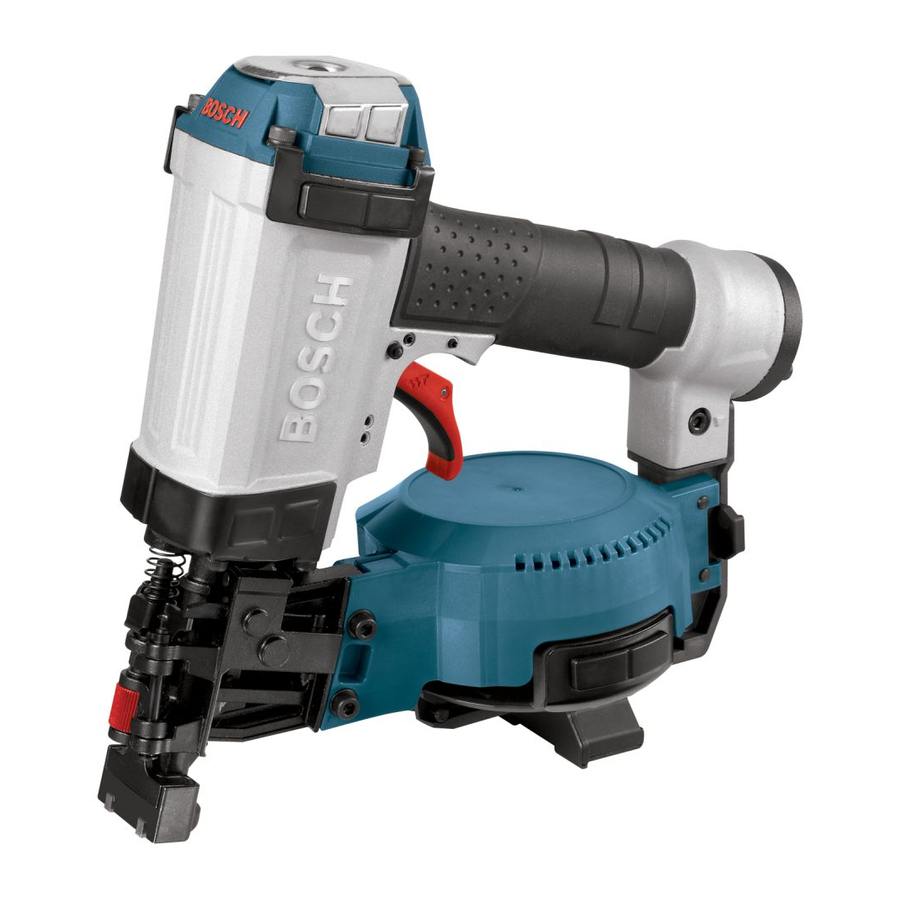Bosch RN175 작동/안전 지침 매뉴얼 - 페이지 3
{카테고리_이름} Bosch RN175에 대한 작동/안전 지침 매뉴얼을 온라인으로 검색하거나 PDF를 다운로드하세요. Bosch RN175 43 페이지.

BM 2610957383 06-09:BM RN175 03-09 6/22/09 8:01 AM Page 3
Disconnect the tool from the air source before
removing or installing triggers, making adjustments,
clearing jams, unloading fasteners, adjusting shingle
guide, leaving the work area, performing tool
maintenance or storing the tool. Such precautionary
safety measures reduce the risk of unintentional tool
operation.
Never carry the tool by the hose. The tool, air fittings and
the air hose may become damaged.
Use clamps or another practical way to secure and
support the work piece to a stable platform. Holding
work by hand or against your body is unstable and may lead
to loss of control or personal injury.
The correct pressure is the lowest pressure that will do
the job. Always follow recommendations for the particular
tool.
Maintain tools with care. Properly maintained tools are
less likely to break and cause injury. Any alteration or
modification is a misuse and may result in a dangerous
condition.
Maintenance performed by unauthorized personnel may
result in misplacing of the internal components which
could cause serious hazard. We recommend that all tool
service be performed by a BOSCH factory service center or
authorized BOSCH service station.
Develop a periodic maintenance schedule for your tool.
When cleaning a tool be careful not to disassemble any
portion of the tool since internal components may be
misplaced or safety components may be improperly
mounted. Certain cleaning agents such as gasoline, carbon
tetrachloride, ammonia, etc. may damage plastic parts and
o-rings.
When servicing the tool, use only recommended
BOSCH replacement parts. Follow instructions in the
Maintenance section of this manual. Use of unauthorized
parts or failure to follow Maintenance Instructions can cause
a risk of injury.
Use only the air tool lubricants supplied with the tool or
specified by BOSCH. Do not use other lubricants as they
may damage the tool. See the "Lubrication" section for a list
of recommended air tool lubricants.
Safety Rules for Pneumatic Nailer Tools
Always assume the tool contains nails. Check the
magazine for nails that may be left in the tool, even if you
think the tool is empty or disconnected.
Never point the tool at yourself or others in the work
area. Always assume the tool contains nails. If nails are
accidentally fired, it may result in injury. The tool is not a toy
and should not be used like one.
Remove finger from the trigger when not driving nails.
Always carry the tool by the handle only. Removing your
finger from the trigger when not operating the tool reduces
the risk of unintentionally firing a nail and injuring yourself or
someone else.
Do not disable or remove the work contact element.
This tool is equipped with a safety mechanism, the work
Service
Replace missing or damaged warning labels. Refer to
tool schematic for correct placement and part number.
Keep the tool clean and lubricated. Clean the tool at least
daily and lubricate as required. Never operate a dirty or
malfunctioning tool.
When not in use, store the tool out of reach of children
and other personnel unfamiliar with tool operation.
When not in use, the tool should be disconnected and
stored in a dry place. Keep out of reach of children. Lock
the storage area. Tools are dangerous in the hands of users
unfamiliar with the tool.
Air Source
Never use oxygen or other bottled gases as a power
source. Explosion may occur. Combustible gases and other
bottled gases are dangerous and may cause the tool to
explode.
Use only clean, dry, regulated, compressed air within
the rated pressure range marked on the tool. Do not
exceed maximum recommended air pressure marked
on the tool. Verify prior to using the tool that the air source
has been adjusted within the rated air-pressure range. Be
sure the air pressure gauge is operating properly and check
it at least twice a day. Tools operated in excess of their
maximum pressure rating may operate abnormally or burst,
resulting in personal injury.
Never connect the tool to an air source that is capable
of producing air pressure exceeding 200 PSI. Excessive
pressure can cause abnormal operation or cause the tool to
burst, resulting in personal injury.
Do not abuse the air hose. Protect all hoses from kinks,
restrictions, solvents or sharp objects. Keep air hose
away from heat, oil, sharp edges or moving parts.
Replace damaged hoses immediately. Damaged hoses can
burst or whip around.
Check all fittings, hoses, pipes, connections and
compressor before each use of this tool. Repair or
replace damaged or leaking hoses and connections
immediately. Damage to a hose or connection can cause a
pressure hose to break and whip around the work area, and
can lead to injury.
contact element, to reduce the risk of accidental firing.
Disabling this component can result in unintentional firing.
Do not use the tool unless the work contact element is
working properly. If the work contacting element is not
functioning correctly, the tool can fire unexpectedly.
Never use non relieving couplers and/or female quick
disconnect couplings on the tool. Non relieving couplings
and female couplings will trap high pressure air in the tool
when the air line is disconnected. This will leave the tool
charged with enough air after it has been disconnected to
drive a nail. Only MALE pneumatic type air connectors
should be fitted to the tool, so that high pressure air in the
tool is vented to atmosphere as soon as the air line is
disconnected.
3
